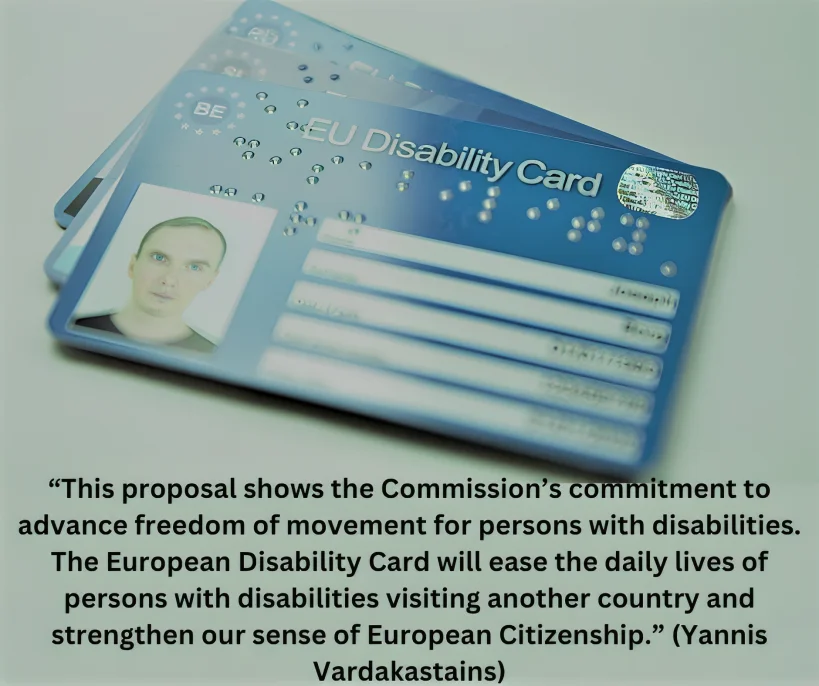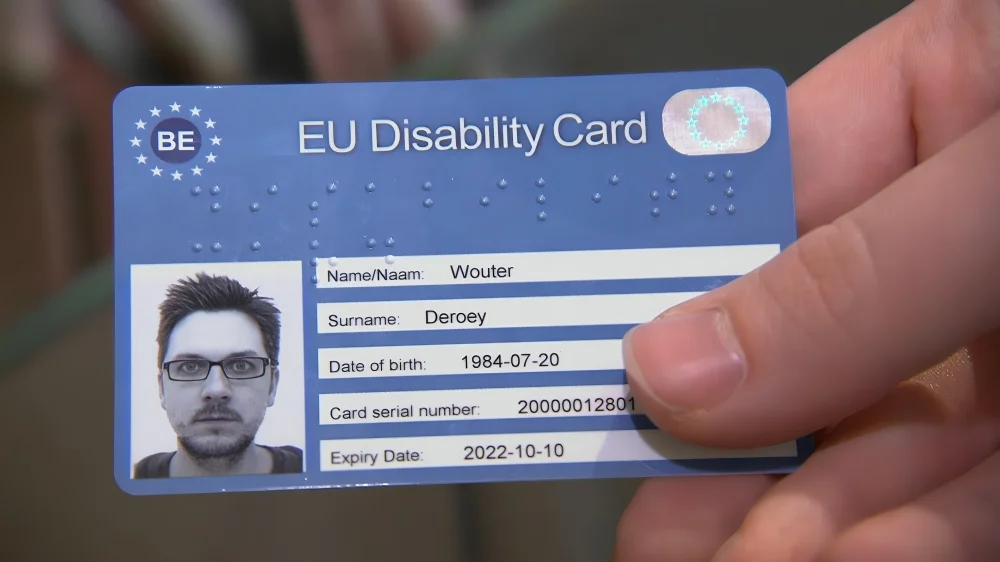Featured
EU’s New Disability Cards Ease Cross-Border Travel for Individuals with Disabilities

The EU disability card is a recent effort from the European Union, which has a long history of upholding inclusion and human rights. This card, which is intended to empower people with disabilities, is poised to transform cross-border travel for people with disabilities and guarantee that everyone can enjoy the richness and beauty of Europe.
Comprehending The European Union Disability Card
The EU disability card, a ground-breaking instrument that provides a plethora of advantages to its holders, is at the center of the EU’s inclusion initiatives. This card gives you priority access to transportation, tourist attractions, and cultural institutions throughout all member states, making it the key to seamless travel experiences.
The EU Disability Card’s Advantages
The advantages of having an EU Disability card are numerous, ranging from useful features like lowered admission costs to necessities like help and support. It’s a daring step toward equality, making sure that a disability doesn’t take away from the excitement of discovery.
Qualifications And Application Procedure
The comprehensive qualifying requirements for the EU disability card are made to accommodate a wide range of disabilities. The EU’s commitment to accessibility is shown in the application process for the disability card, which is a simple process that allows all qualified individuals to enjoy travel freedoms.
Improving Cross-Border Mobility For Person With Disabilities
The creation of the EU disability card is a shining example of advancement for disabled people traveling inside the EU. It removes administrative and physical obstacles to create a travel experience that is easy and dignified.
Accessibility And Disability Rights In The EU
The EU disability card is a bold assertion of disability rights in the EU, not just a tool for easier travel. It transforms the long-advocated EU principles of the United Nations Convention on the Rights of Persons with Disabilities into concrete travel benefits.

The Effect On Accessible Tourism In The EU
The EU disability card has significant knock-on effects for accessible travel inside the EU. It serves as a catalyst for change, forcing the travel and tourist sector to reconsider and improve its accessibility features. This not only improves the vacation experience for those with disabilities but also points to a change in the tourist industry toward greater inclusivity.
A Heritage Of Liberty And Inclusivity
The EU’s new disability card is a symbol of inclusivity and the strength of group will, as well as a significant advancement in accessibility. It is a major win for disability rights in the EU and a sign of the solidarity of the European people in recognizing that freedom and mobility are rights that everyone has, not just some.
This card has the power to change lives in addition to making cross-border travel easier for people with disabilities. It’s a promise of a more inclusive future, a bridge between cultures, and a gateway to new experiences. Around the world, the EU is spreading a message of opportunity and hope as it leads the way in accessible tourism.
The perks of travel are not the only things that the EU disability card has to offer. It is a force for transformation, prompting businesses, authorities, and communities to reconsider their stance on diversity. The card pushes us to stretch our imaginations and see a society in which everyone, regardless of ability, can easily and dignifiedly discover the wealth of our diverse continent.
As we commemorate the introduction of the EU disability card, we also anticipate the tales of trips undertaken, obstacles overcome, and opportunities gained. This card is more than just a piece of plastic; it represents a Europe that appreciates each and every one of its citizens and welcomes them all.
The smiles on people’s faces, the experiences it makes possible, and the conversations it sparks about the value of accessibility in all facets of life will ultimately be the real indicators of the success of the EU disability card. It’s a step toward a future in which being “disabled” doesn’t imply limitations but rather a new perspective on the wonders that surround us.
The EU disability card serves as a beacon of progress and a timely reminder that, when we band together for the greater good, we can make the world a more prosperous, compassionate, and inclusive place for all.
Obiosah Rowland
Featured
Seven Supermarket Chains Under Fire for Introducing Inaccessible Fridges

In a push for innovation and energy efficiency, seven major supermarket chains including, Aldi, Asda, Lidl, Morrisons, Sainsbury’s and Tesco have introduced new fridges across their stores. While the rollout is being celebrated for its potential to reduce environmental impact, the move has sparked a backlash from the disabled community, who argue the design disregards accessibility needs.
Many disabled shoppers report that these designs create significant barriers for people with mobility impairments, visual impairments, and other disabilities.
Key Accessibility Concerns
- Heavy or Complex Doors
Some of the fridges feature heavy sliding doors or mechanisms requiring significant dexterity or strength. For those with arthritis, muscular disorders, or limited upper body mobility, opening the doors becomes an impossible task. - Crowded Layouts
Reports from disabled shoppers also highlight how narrow aisles and tightly packed fridge layouts exacerbate the problem, making it difficult for those using mobility aids to maneuver around these installations.

Impact on Disabled Shoppers
Disabled shoppers have expressed frustration, describing the rollout as a step backward in the fight for inclusion. Sarah Johnson, a wheelchair user and disability advocate, shared her experience:
“It’s demoralizing. I used to shop independently, but now I need help with basic things like getting a carton of milk. These designs weren’t made with people like me in mind.”
Others have voiced concerns about the message this sends. Activist Marcus Wong commented:
“These inaccessible fridges highlight a broader issue in retail: a failure to consult the disabled community during design processes. Inclusion needs to be part of the blueprint, not an afterthought.”
Supermarkets’ Response
Some supermarket chains have issued statements defending the changes. A spokesperson for one chain said:
“The new fridges are part of our commitment to sustainability and energy efficiency. We’re actively seeking feedback to ensure they work for all customers.”
However, critics argue that this response lacks urgency. While environmental considerations are crucial, they contend that accessibility shouldn’t be sacrificed for progress.

Calls for Action
Disability advocates are urging supermarkets to take immediate steps to address these barriers. Key recommendations include:
- Consulting with disabled shoppers during future design processes.
- Implementing universal design principles to ensure fridges are accessible to all customers.
The issue also highlights the importance of adhering to accessibility laws, which often mandate equal access to goods and services.
Conclusion
The introduction of inaccessible fridges by seven major supermarket chains underscores a growing tension between technological innovation and inclusivity. While strides in sustainability are important, they must not come at the cost of excluding disabled shoppers. As calls for accessibility reforms grow louder, the spotlight is on these supermarkets to demonstrate their commitment to serving all members of their communities.
Featured
Disability Rights Campaigners Call for Assisted Dying Legislation
Disability rights campaigners are urging MPs and peers to support assisted dying legislation. They emphasize that everyone deserves the chance for a good death. This call is led by Tom Shakespeare, a prominent professor of disability research at the London School of Hygiene & Tropical Medicine.
Supporting Terminally Ill Individuals
The group expresses solidarity with terminally ill individuals who seek the option of assisted death. They acknowledge the concerns raised by opponents regarding the value society places on disabled lives. A documentary titled Better Off Dead? by actor Liz Carr highlights these risks. However, Shakespeare and his co-signers argue that disabled people represent a diverse community. Their experiences and opinions vary significantly.
In a letter to parliamentarians, the campaigners state, “We know some prominent disabled individuals oppose assisted dying. However, polling shows this view is not representative of the majority.” They point to an Opinium poll conducted for Dignity in Dying, indicating that nearly 80% of disabled individuals support assisted dying legislation.
The Right to Autonomy and Control
The letter emphasizes that all individuals deserve a good life and the autonomy to make decisions about their futures. It highlights the importance of independent living. As people approach the end of their lives, they should also have the option for a dignified death, with various choices available.
The campaigners express concern that too many individuals suffer in pain. They argue that assisted dying legislation is a compassionate response to this suffering. The proposed law in the UK focuses on terminally ill, mentally competent adults. This legislation has not expanded in similar laws in Oregon, Washington, and other US states.
Upcoming Legislative Debate
A private member’s bill, introduced by Labour MP Kim Leadbeater, aims to legalize assisted dying for those who meet specific criteria. The bill is scheduled for discussion next month in Parliament. If it receives initial support, it will undergo further scrutiny by committee members.
Although the sentiment for assisted dying legislation may have shifted since the overwhelming rejection in 2015, the outcome remains uncertain. The letter has also been signed by several prominent individuals in the disability rights community, further demonstrating support for this crucial issue.
Election 2024
Voters with Disabilities: Feeling Overlooked in the 2024 Presidential Race

A new Rutgers University report estimates 40.2 million eligible voters in the upcoming U.S. presidential election are disabled. When factoring in people who live with someone who has a disability, nearly one-third of the voting population is involved. Despite this, many voters with disabilities feel overlooked, especially on health care—a central campaign issue.
A Growing Voting Bloc
As the U.S. population ages, the number of voters with disabilities is increasing. However, many challenges still exist. These include inaccessible campaign materials and the fact that candidates like Donald Trump and Kamala Harris rarely address disability-related issues, such as the ongoing impact of COVID-19. Trump recently made comments at a rally that were viewed as discriminatory by advocacy groups.
Advocates Demand Recognition
Dom Kelly, founder of New Disabled South, says this voting bloc is essential. “We are their path to victory,” he insists, warning that ignoring this community could affect election outcomes. Matt Mills, a 41-year-old voter from Ohio who has lupus and other health issues, supports Harris for her health policies but still feels disabled voters are often overlooked.
Mixed Experiences with Candidates
Jim Piet and Patricia Vincent-Piet, a married couple from New Hampshire who both have cerebral palsy, have had varied interactions with political candidates. Some have been receptive, while others have not. Their main concern is policy, especially Medicaid, which provides essential support to people like Jim. They plan to vote for Harris due to fears that Republicans may cut Medicaid services.
Damaging Political Rhetoric
Trump has a history of offending the disabled community, such as when he mocked a disabled journalist in 2015. Recently, he falsely claimed at a rally that Harris was “mentally impaired,” leading to criticism from advocacy groups. Meighan Stone, who uses a wheelchair due to long COVID, emphasizes that the issue goes beyond offensive comments. “We live with this discrimination daily,” she says.
Addressing the Issues
The Harris campaign has taken steps, such as hiring Anastasia Somoza, a disability advocate, as its disability engagement director. Somoza, who has cerebral palsy, has been working to ensure campaign events are accessible, offering virtual options. However, a recent virtual event fell short, causing frustration for voters like Marissa Ditkowsky, who has muscular dystrophy. Technical issues such as missing closed captioning and a sign language interpreter made the event less accessible.
Ensuring Voting Accessibility
The U.S. Election Assistance Commission is working to ensure voters with disabilities can vote independently and privately. Commissioner Benjamin Hovland stresses the need for better training for poll workers. Training will include ways to assist those with anxiety or who process information differently.
Patti Chang, a blind voter from Chicago, explains that exclusion goes beyond the political sphere. “Society needs to expect more inclusion,” she says. “This issue doesn’t just affect voting; it’s everywhere.”
Conclusion
With millions of voters with disabilities preparing to vote, both campaigns need to address their concerns. Making campaign platforms accessible and engaging with these voters could have a significant impact on the election.













